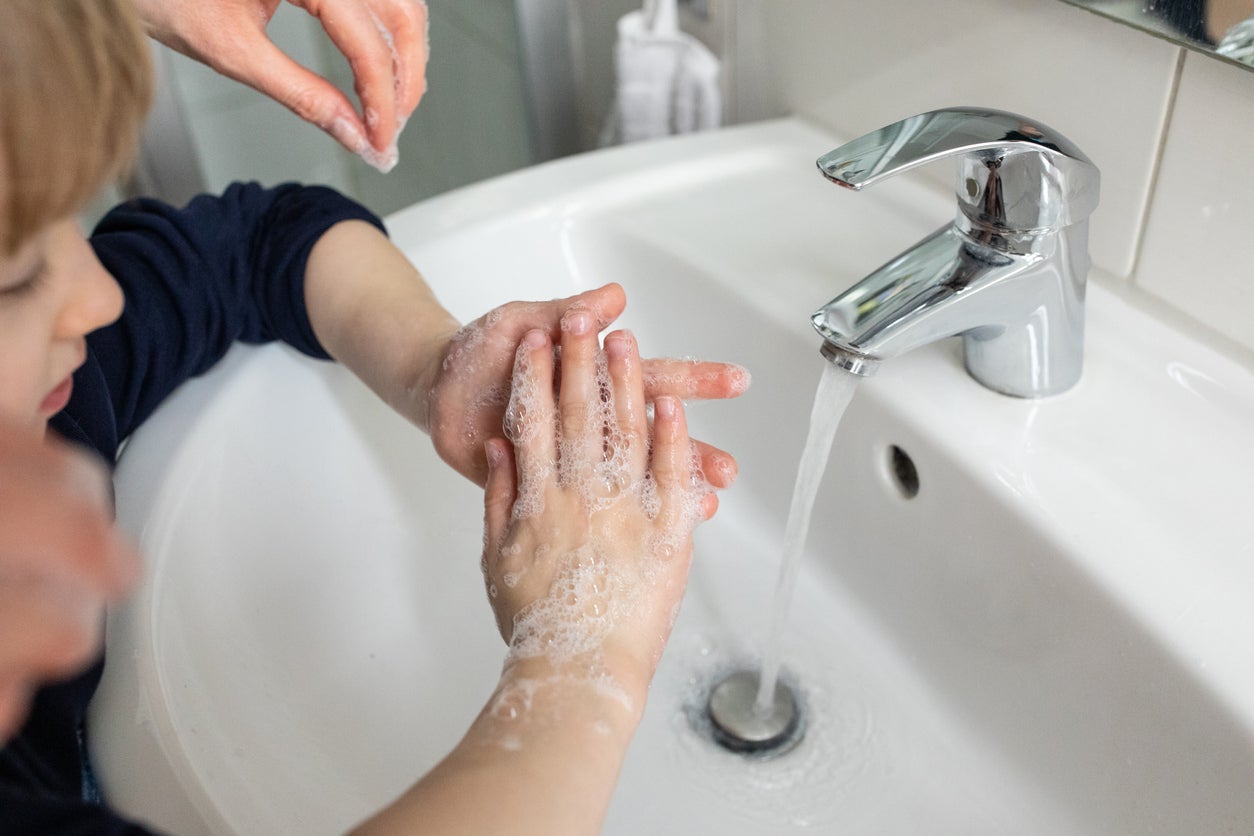‘My child is obsessed with washing her hands’ – will coronavirus lead to a generation of hypochondriacs?
For some, an obsession with cleanliness can develop into a bigger problem – we must watch for warning signs, writes Sarah Garden

My daughter is a pandemic baby. Her first birthday was cancelled due to lockdown, one of her first words was “mask”, and she learned how to wash her hands before she learned how to walk. Having now spent a third of her life under restrictions, she’s blissfully unaware that not going into other people’s houses or giving relatives a hug is strange.
It is all worlds away from how I grew up, with sloppy kisses from grandparents and adventures with friends. The spread of infection wasn’t something I’d ever really think about. And yet, even against the backdrop of these laidback formative years, I can still be sucked into frantically Googling symptoms for the slightest ache or pain. So what hope does my daughter’s generation have?
Current school guidelines cover things such as limiting the use of shared objects and regular hand washing. Almost every parent I speak to tells me that strict hygiene practices are now ingrained in their children’s behaviour. “My seven-year-old son stresses about washing his hands,” says Emma, a mother of three. “He asks for hand sanitiser when he gets in the car and he reminds his brother that he shouldn’t be touching things.” Elaine has noticed a similar difference in her five-year-old daughter. “She’s obsessed with washing her hands,” she explains. “She goes through a small bottle of hand sanitiser every week.”
This newfound vigilance is great from a public health perspective, and I’m sure parents across the country are pleased that they don’t need to remind their children to keep clean. However, for some, it can develop into a bigger problem and I worry that young children are in danger of longer-term problems, such as OCD.
Childline notes that 30 per cent of their counseling sessions since the initial March lockdown have mentioned anxiety. The charity provided me with a general snapshot of the type of calls they have received. A 16-year-old girl said: “I can't cope with this virus. I haven’t got it, but I’m terrified that my family is going to get it. I don’t care about me but I feel like I can’t breathe when I think about my family getting it. What if they die? What if it’s my fault? I can’t stop washing my hands, I wash them over and over again to the point where they’re bleeding, but I can't stop.”
Parents and caregivers have a tough balancing act. In order to keep children safe and limit the spread of the virus, we need them to be aware of what’s going on but we also need to know the warning signs in case they start to be consumed with worry.
Dr Polly Waite, clinical psychologist and associate professor at the University of Oxford, who studied mental health changes in young people during lockdown, says there are things to look out for. “In terms of health anxiety, your child might ask lots of questions about becoming ill or passing it on to other people,” she explains. “Often the information doesn’t do the job of sufficiently reassuring, so they ask again and again. They might check their symptoms with you. You also might find that your child is on the lookout for danger all the time.”
Dr Waite advises against engaging in too much reassurance seeking, making sure children have plenty of opportunity to get muddy, so they’re not overly worried about germs, and being aware of the conversations you’re having within earshot.
“The important thing is for children to see the adults in their lives coping with it,” she adds. “We want kids to be resilient, so we should model facing our fears, dealing with stuff, and giving ourselves a pat on the back rather than trying to pretend that everything is fine.”
The good news is that, for the most part, children are pretty hardy. Most kids will wash their hands more, listen to the rules, and then carry on with life without giving it much thought. Even kids who are more tuned into possible dangers aren’t necessarily a cause for concern.
Dr Kate Cooper, clinical doctoral research fellow at the University of Bath, who recently co-authored a review on health anxiety in young people in context of the pandemic, points out that we shouldn’t expect all children to mirror their pre-Covid selves. After all, when living in a pandemic, feeling a bit anxious about health is both normal and necessary. “The difficulty comes if your anxiety about your health starts ruling your life and stops you doing other things,” she says.
Understanding how hyper-vigilance surrounding health could affect children when Covid-19 is under control isn’t easy, as there is no historical data. “There’s very little out there about health anxiety in context of the pandemic, but actually there’s very little research about health anxiety in children and young people in general,” Dr Cooper explains. “The last time there was a global pandemic, psychology was at a very different stage of scientific endeavor and research.”
Much like the Covid-19 virus itself, when it comes to mental wellbeing, we’re living through a live research study. It’s only when we start to emerge from the other side that we’ll learn what the lasting effects of growing up in a pandemic truly are.
Join our commenting forum
Join thought-provoking conversations, follow other Independent readers and see their replies
Comments
Bookmark popover
Removed from bookmarks